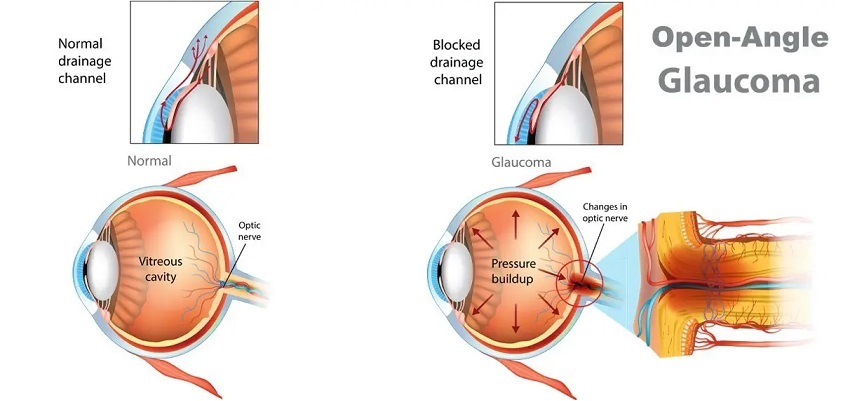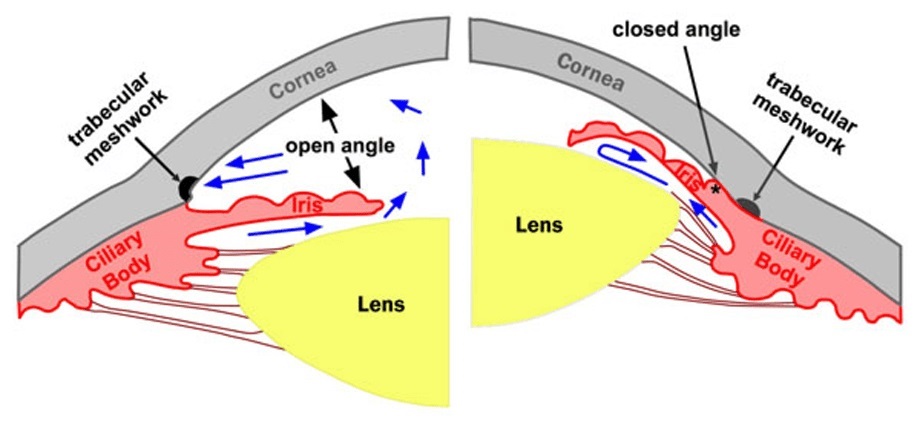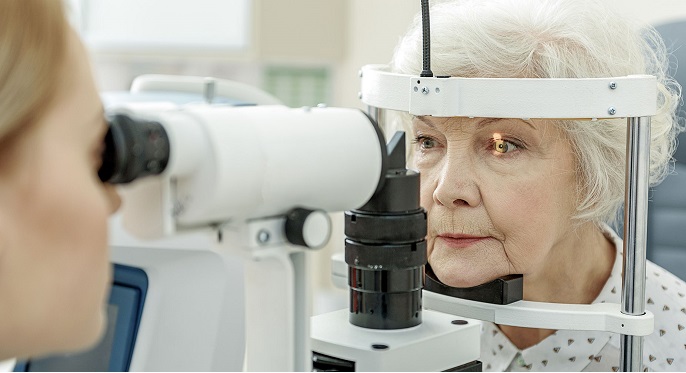Best Hospital for Glaucoma Treatment in Navi Mumbai & Mumbai
Laxmi Eye Hospital offers the best glaucoma treatment in Navi Mumbai. This is NABH accredited hospital for glaucoma treatment. Book an appointment now! we have centres at Panvel, Kharghar, Kamothe and Dombivali.
What is Glaucoma?
Glaucoma is the name given to a set of different eye disorders which cause progressively increasing damage to the optic nerve, leading to progressive, irreversible loss of the visual field. The optic nerve connects and transmits visual signals from the eye to the brain.
In most types of glaucoma, the pressure within the eye is higher than normal, and this high pressure directly damages the nerve. Not every eye with high pressure develops glaucoma.
However, it is a known risk factor, and people with high pressure need regular eye examinations to rule out glaucoma. There is no specific level of eye pressure that definitely causes glaucoma or eliminates the risk of glaucoma. In some cases, normal pressures can still lead to glaucoma.
You can get more information and advice at Laxmi Eye Institute – The best place for glaucoma care in Navi Mumbai and around.

Causes of Glaucoma
Glaucoma can occur without any other eye disease present. This is called Primary glaucoma and can be of two types – Open-angle or Closed-angle, depending on the status of the drainage angle.
Occasionally, glaucoma can be a complication of other eye diseases. This is then called Secondary glaucoma and can occur due to injury, eye inflammation, cataract, advanced diabetes, and the use of certain medicines. Glaucoma can also occur as a congenital entity in newborns due to abnormal development of the eyeball, which does not allow the aqueous fluid to be drained out normally.
Symptoms of glaucoma
Since glaucoma is a silent stealer of sight, it rarely shows symptoms. Patients often come to us with complete vision loss in one eye.
Symptoms of glaucoma can vary depending on the specific type and stage of the disease. Some common types of glaucoma include:
Open-angle glaucoma Symptoms:

No symptoms in the early stages.
As it progresses, it can lead to loss of peripheral vision, eventually leading to tunnel vision.
Closed-angle glaucoma Symptoms:

Severe eye pain,
Blurred vision,
Halos around lights,
Redness,
Headache,
Nausea,
vomiting.
Normal tension glaucoma Symptoms:
In the early stages of glaucoma, there are usually no symptoms. As the condition progresses, you may experience gradually blurred vision. In the later stages, there can be a loss of side vision.
Congenital glaucoma Symptoms:
Infants born with this condition may have symptoms such as
cloudiness in the front of the eye,
enlarged eyes,
excessive tearing,
sensitivity to light,
a constant need to rub their eyes.
It is important to note that the early stages of glaucoma often have no obvious symptoms, which is why regular eye exams are essential for early detection and treatment. If you have concerns about your eye health, it is best to consult an eye care professional.
Glaucoma Treatment Options in Navi Mumbai
Glaucoma treatment aims to control the progression of the disease and preserve vision. The specific treatment plan depends on the type and severity of glaucoma. Common treatment options include:
Eye Drops: Medicated eye drops are often the first line of treatment for glaucoma. These drops help reduce eye pressure by either increasing the outflow of fluid or decreasing its production.
Oral Medications: In some cases, oral medications may be prescribed to lower eye pressure. These medications are typically used when eye drops alone are insufficient in controlling glaucoma.
Laser Therapy: Laser procedures can be performed to improve the drainage of fluid from the eye, reducing intraocular pressure. Examples include laser trabeculoplasty, iridotomy, or cyclophotocoagulation.
Surgical Procedures: In advanced cases or when other treatments aren't effective, surgical intervention may be recommended.
Trabeculectomy, shunt implantation, or minimally invasive glaucoma surgery (MIGS) are some surgical options available.
Micro-Invasive Glaucoma Surgery (MIGS): MIGS is a newer approach that involves minimally invasive procedures, often combined with cataract surgery, to lower eye pressure and reduce dependence on medications.
It's essential to work closely with an ophthalmologist to determine the most suitable treatment plan based on individual circumstances. Regular follow-ups and adherence to prescribed medications are vital in managing glaucoma effectively.
Are you looking for the best and most experienced Glaucoma Specialist? Visit Navi Mumbai's Largest eye hospital for Glaucoma Treatment.

Am I at Risk? - a glaucoma specialist can answer your question! You are considered to be in a higher-than-normal risk category if you have any of the following:
High IOP
Age >40 years
Family history of glaucoma
History of eye injury
History of steroid use, topically / systemically
Are near-sighted (myopia, need minus powered spectacles)
Best advised getting diagnosis and glaucoma treatment in Dombivli.
Other risk factors, which can be detected only on examination include:
High eye pressure
Thin corneas
Differences in the optic nerves of both eyes
You must consult a glaucoma specialist if you have any of these risk factors. Best advised to get a diagnosis and glaucoma treatment. At Laxmi Eye Institute, we can determine your risk level and need for future check-ups. Truly a life-changing experience after glaucoma treatment @LEI trusted & experienced eye specialist in Navi Mumbai.
How to Prevent Glaucoma?
While it is not possible to completely prevent glaucoma, there are several steps you can take to reduce the risk of developing the condition or to slow down its progression. Here are some tips:
Schedule Regular eye exams with an ophthalmologist or an optometrist. These exams can help detect early signs of glaucoma or other eye conditions, allowing for timely treatment.
Understand the risk factors associated with glaucoma, such as age people over 60 are at higher risk, family history of glaucoma, and certain medical conditions, e.g., diabetes, hypertension, and previous eye injuries. If you have any of these risk factors, getting regular eye exams is even more important.
Follow your doctor's recommendations regarding medication, diet, exercise, and regular check-ups.
Use protective eyewear when engaging in activities that could cause eye injuries, such as playing sports or working with tools and machinery. This can help reduce the risk of glaucoma due to trauma or injury.
Maintain a healthy weight.
Eat a balanced diet rich in fruits and vegetables, exercise regularly, and avoid smoking. These lifestyle choices promote overall health and may also positively impact eye health.
Use eye drops as prescribed. It is important to use eye drops as directed and to follow up with regular check-ups to monitor the effectiveness of the treatment.
Make An Appointment
All Copyright© Reserved @ Laxmi Eye Hospital And Institute
